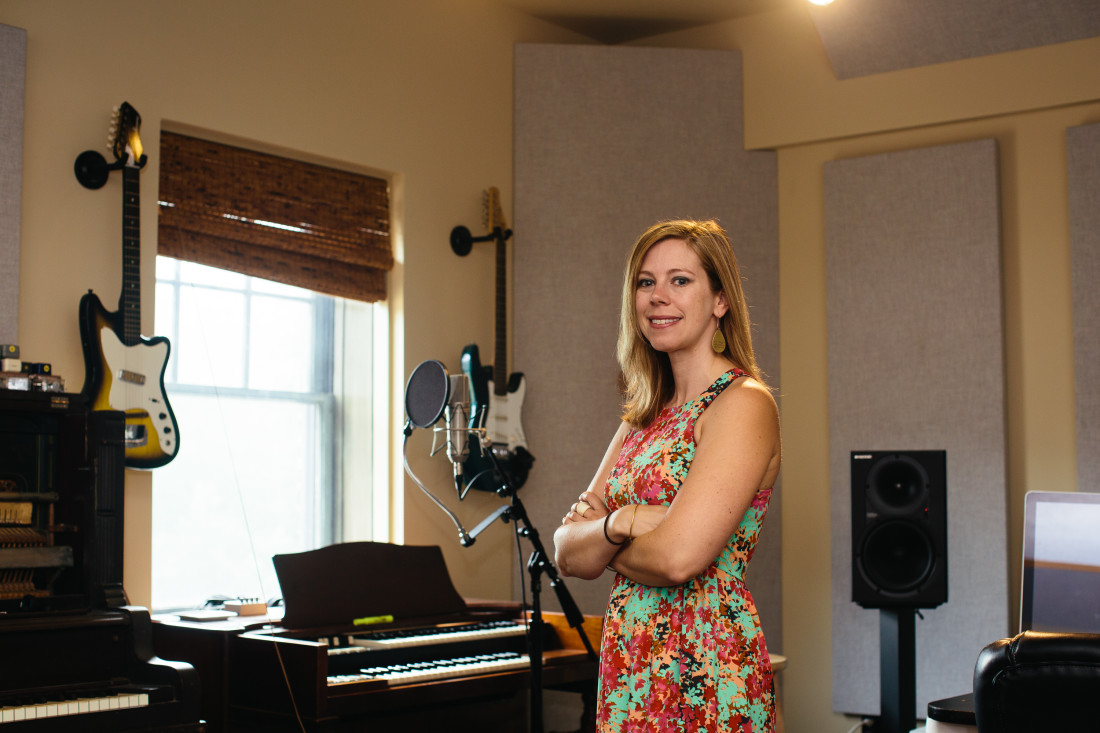Recording studios tend to focus on a single thing: crafting great albums. Echo Mountain does that well, with Grammy-winning projects by the likes of the Steep Canyon Rangers and the Zac Brown Band to its credit. But the downtown Asheville studio, opened by Steve Wilmans in 2006, does a lot more than just make records. Other recent projects include a foray into e-books (starting with Stephen King’s Doctor Sleep), a collaboration with music tastemaker Daytrotter, and hosting events like The Society of Professional Audio Recording Services’ Studio Summit, the HATCH festival and a Creative Sector Summit panel discussion sponsored by the Asheville Area Arts Council.
At that panel, says Echo Mountain studio manager Jessica Tomasin, participants kept commenting on “the real, genuine nature of the people who live here and care about the place” — which is part of what sets Asheville apart from music industry meccas like Nashville, Austin and New Orleans. “Is it possible for us to have a thriving community here in terms of the music business? Yes. People are already starting to do it,” says Tomasin. But comparisons to bigger cities just don’t make sense. What Asheville has to offer, through a grass-roots approach, is resources for musicians who move here and opportunities such as festivals put on by outside promoters.
They’ll build this city
But grass roots or not, that kind of infrastructure takes organization, which is where Asheville Music Professionals comes in. The embryonic group grew out of a conversation Tomasin had with music business veteran Michael Selverne and Mike Morel, the Asheville Symphony’s marketing and production manager. They were talking about the music community’s need for both representation and cross-pollination.
It’s not a new idea: Years ago, a group called Future of Asheville Music similarly aspired to provide a common voice for those involved with local music. AMP, though, has legs, pooling the ideas and talents of studio and venue owners, talent bookers, festival organizers, publicists, managers and musicians. Together, they’re scheduling workshops and educational opportunities, brainstorming collaborative opportunities, and considering ways to achieve fair pay and workable arrangements between performers and venues, among other projects.
Tomasin, who has a technical theater background, has been with Echo Mountain since the beginning. “I love music; it’s my passion,” she says. And though her prior recording experience was limited, “I jumped in with both feet. I’ve enjoyed every minute of learning everything that goes on behind the scenes.” Her résumé quickly grew to include artist management, producing shows and running the studio’s short-lived Echo Mountain Records label. “I enjoy the aspect of taking something from concept to reality,” she says.
In a sense, that’s where Western North Carolina’s burgeoning music industry is now: still in the concept phase but becoming a reality. And the local community, says Tomasin, can proceed using the quirky DIY approach it’s known for: “Instead of coming out with a glossy product, it’s the Asheville way to just progress along. … We’re not waiting for anyone else, like Sony, to come in and build infrastructure.”
Friends, neighbors, collaborators
Echo Mountain’s second studio — in the historic Salvation Army building adjacent to the former church that houses the main recording space — is a kind of microcosm of what that self-made infrastructure might look like. To help offset a hefty property tax bill, Wilmans decided to rent out space on the main building’s upper level. Musician and producer Ben Lovett, publicity and marketing service Mason Jar Media, video production house IamAVL and independent music organization NewSong all have offices in the Patton Avenue facility and, like good housemates, collaborate on projects. Tomasin has worked festivals with Mason Jar; IamAVL provides live video stream for Echo Mountain events; and Lovett has worked on music video projects for Echo Mountain clients. On top of that, says Tomasin, “Ben and I had a kickball team together.” This is Asheville, after all: All work/no play just won’t cut it.
“I get calls all the time from producers and engineers who are interested in Asheville,” says the studio manager. But while these people might be dazzled by the city’s potential, Echo Mountain’s staffers actually live here. That means they understand WNC’s realities, whether it’s the low wages/high rents obstacle or the importance of DIY know-how and team spirit. So when it comes to small bands who’ve stretched their budget to record at the studio, “We’re all in the same boat, and we know what it takes to be able to get the money together to be able to do that,” says Tomasin. “You have a lot more riding on a record when you’ve put everything you have into it.”
In other words, she continues, everyone gets treated the same, whether it’s Yo Mama’s Big Fat Booty Band or Steve Martin — “except that Steve Martin gets better snacks.” Early on at Echo Mountain, she says, “I knew that it had to be a resource for the community. There’s too much talent here for it not to be.”
AMP, meanwhile, though still in the formative stage, plans to build on that idea. By linking those who come to Asheville to enjoy good music and those who work to create it, the whole community benefits. And that’s just good business sense.



Just trying to figure out if there is a website for the Asheville Music Professionals. Facebook page?